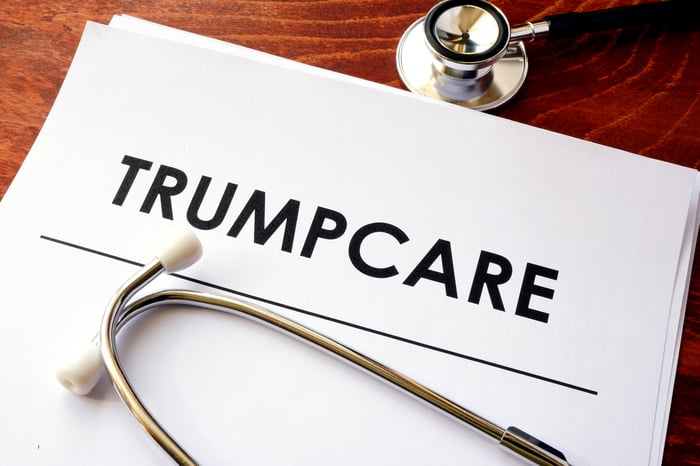When Donald Trump won the November presidential election, it was assumed by many that the Affordable Care Act (ACA), more commonly known as Obamacare, was running on borrowed time. Trump had campaigned heavily on the idea that Obamacare would be repealed and replaced shortly after taking office. Considering that Republicans retained their majorities in both the House and Senate, this appeared to solidify Trump's prophecy.
However, in the words of our president, "Nobody knew healthcare could be so complicated!" Nearly five months since he took office, Obamacare remains the health law of the land, and it'll likely remain so for the foreseeable future unless some major progress is made in the Senate on the American Health Care Act (AHCA), the GOP's replacement plan for Obamacare, which is being referred to as Trumpcare.

Image source: President Donald J. Trump's official Facebook page. Photo by Shealea Craighead.
Trumpcare, in a nutshell
An initial version of Trumpcare, introduced in March, failed to even make it to a vote in the House. The reason? Factions within the Republican party didn't support the original bill because they felt it either didn't roll back enough of Obamacare's Title I mandates or they believed the AHCA took too much away from their constituents. A modified version of the bill was presented in early May with two new provisions, and it wound up passing the House by the narrowest of margins. Today, the bill has made its way to the Senate for discussion.
Here are the basic tenets of what Trumpcare would do if the bill were passed in its current form:
- It would get rid of the individual and employer mandate, as well as the Shared Responsibility Payment, which is the penalty you pay for not buying health insurance.
- Income-based subsidies would be replaced with age-based tax credits that cap at $4,000 annually for those aged 60 to 64.
- Medicaid disbursements would be done on a per-capita basis, and Medicaid expansion would end on Jan. 1, 2020.
- Older adults could be charged up to 67% more for their premiums under the AHCA relative to younger adults compared to Obamacare.
- A $108 billion risk pool would be created to help states cope with higher-risk (i.e., sicker) patients between 2018 and 2026. Initially this figure was $100 billion, but the Upton Amendment added $8 billion. This is one of the two aforementioned Amendments passed in the second version of the AHCA.
- Insurers would have the authority to tack on a 30% surcharge to the premiums of consumers who didn't have continuous coverage in the previous year.
- Health savings account contribution limits would nearly double.
- The net investment income tax and Medicare surtax would be repealed.
- Children would be allowed to stay on their parents' plans till age 26, the same as under Obamacare.
- The 10 minimum essential health benefits mandate would stay, but individual states could apply for a waiver from those mandates. The original version of Trumpcare had no such waiver. The waiver, known as the MacArthur Amendment, is what satisfied Republicans who felt the AHCA didn't go far enough to scale back Obamacare's Title I mandates.

Image source: Getty Images.
This all but proves Trumpcare is in serious trouble
However, Trumpcare has a seemingly mile-high mountain to climb if it's going to get the votes it needs in the Senate to be passed by Congress and head to President Trump's desk. Despite a congressional majority, here are four indications that Trumpcare is in serious trouble.
1. Senate leaders refer to Trumpcare as "dead on arrival"
It pretty much doesn't get more concrete than when top Senators called the healthcare bill drafted in the House "dead on arrival," as Sen. Richard Burr (R-NC) did two weeks ago. Burr suggested that it was unlikely a healthcare bill would be passed in 2017, and referred to Trumpcare as "not a good plan" while talking with WXII 12 News in North Carolina.
Even going the route of reconciliation, Republicans have a seemingly impossible task at hand. The reconciliation process allows lawmakers to pass bills that impact the federal budget, and only a majority of votes (51 in the Senate) is required. With Republicans holding 52 Senate seats, they could pass the AHCA if all members were on the same page. However, based on Burr's commentary, Republican Senators are clearly not on the same page. Coming to a consensus may only be possible if Trumpcare is completely rewritten, or if major parts of the bill are gutted.

Image source: Getty Images.
2. A damning Congressional Budget Office report
The Congressional Budget Office's (CBO) scoring of the second version of Trumpcare also left a lot to be desired.
The CBO's job was to estimate the impact of Trumpcare over the long-term, which is defined as 10 years. According to the projections, Trumpcare will increase the number of uninsured persons by 23 million over the next 10 years, with 14 million losing coverage in 2018 due to the absence of subsidies that reduce premium costs and expenses tied to visiting the doctor. The age-based tax credits will likely help some younger adults afford their premiums, but lower-income folks across the board are poised to have a tough time finding affordable health insurance.
Those with pre-existing conditions and the elderly are also set to face major challenges under Trumpcare. Since insurers will likely have more freedom when pricing their health plans, Trumpcare would allow older adults and sicker individuals to be charged more. While insurers still can't turn away a consumer, regardless of their health, they could charge a whole lot more in premiums or choose to pass along a hefty deductible.

Image source: Getty Images
3. Scathing reviews from the public
Another indication that Trumpcare is in serious trouble comes from a recent poll conducted by Quinnipiac University.
It's no secret that Trumpcare hasn't been well liked since it was introduced, but the results of Quinnipiac's March survey truly summarizes the discontent Americans feel toward possible changes to their health coverage (keep in mind this survey was done with version one of Trumpcare). Overall, just 17% approved of the AHCA compared to 56% who disapproved, with another 26% undecided. Other shocking statistics include that 74% of survey-takers oppose cuts to Medicaid -- the AHCA would cut more than $800 billion from Medicaid over the next decade -- and 61% disapproved of how President Trump was handling healthcare reform.
In other words, it could be extremely tough to pass Trumpcare in Congress if the GOP's constituents threaten to vote their representatives out of office come the 2018 elections.

Image source: Getty Images.
4. The CMS is reaching out for the public's help
Last, but certainly not least, things are apparently so bad that the Centers for Medicare and Medicaid Services (CMS) issued a press release last week that seeks suggestions from the public on how to reduce the "regulatory burdens of Obamacare."
On one hand, seeking input from the public is great in the sense that it should provide the CMS and Department of Health and Human Services with a bevy of perspectives and ideas. If consumers can't be heard through their representative, they may be able to find an audience by submitting their suggestions directly to the CMS electronically or by mail.
However, the fact that the CMS is seeking suggestions from the public may also suggest that lawmakers are lost as to how to appease the public. Furthermore, time and again we've seen that consumers really don't have a good understanding of Obamacare. A poll conducted earlier this year by Morning Consult found that more than a third of respondents weren't aware that "the Affordable Care Act" was just another name for Obamacare -- and the law was passed seven years ago!
Long story short, Trumpcare appears to be on thin ice. It's possible that Obamacare may very well remain the health law of the land for years to come.




